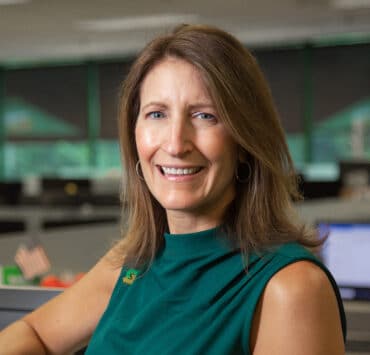|
Getting your Trinity Audio player ready...
|
Paul Liu solves problems. When he was a child, that meant solving problems he saw around the house. Today, as a global leader in intellectual property (IP) law, Liu spends his days working to leverage his extensive knowledge of IP and patent law to resolve whatever issues are facing his company as a whole. Modern Counsel recently caught up with Liu to get his perspective on the IP field and his journey within it.
Describe your path to becoming an IP and patent law expert. How did you first become interested in these fields?
I have always had a love of solving problems and learning about innovative solutions to technical problems. One of my favorite books from when I was younger was The Way Things Work by David Macaulay. I was so inspired by the elegant illustrations and explanations of these intricate inventions that solve real world problems that I often tried to invent things around the house to make my life easier. It was that same fascination with learning about detailed technical solutions that led me to pursue engineering—specifically electrical engineering—in college.
It was during my engineering studies that I met an attorney who told me about an exciting career path in patent and intellectual property law. I had not known that I could leverage my training in engineering in the legal field. I was attracted to that sweet spot of learning about solutions to technical problems not only on a level of implementation but at different levels of abstraction.
Over time, that passion for learning about solutions led me through law school and into a career as an intellectual property and patent attorney. It was along this career path that I began to move from individual transactions—such as the procurement of patent rights via patent grant—to address wider issues, such as how patents and intellectual property are used for business advantage.
Were there any defining moments or experiences that confirmed your interest in IP and patent law?
My parents are in the tech field. My mother was a programmer, and my father was a mechanical engineer. Growing up, I had never been seriously exposed to a career in anything outside a STEM field. However, this changed when I learned about IP and patent law. This revelation seemed to open up new doors that I had never considered so that I could pursue a career in something that was uniquely interesting to me.
You have held a few different positions at varying levels throughout your career. How, if at all, has your perspective on IP and patent law changed as you have taken on more senior roles?
As I have become more experienced, my perspective on IP and patent law has changed from focusing on the individual instruments of IP law to orchestrating the wider usage of these individual instruments for business advantage.
I started in the mundane aspects of procuring individual patent rights. For years, I spent practically every day writing patent applications and negotiating with the US Patent and Trademark Office on behalf of clients to procure patent rights. These transactions were the bread and butter of my practice and instilled a strong habit of discipline in conforming to best practices.
However, after that foundation was established, I became more well-rounded by gaining experience in other areas of IP law, such as trademarks, trade secrets, and copyrights. This helped me broaden my understanding of how intellectual property, as intangible assets, can be best expressed as these various instruments of legal protection. I was also fortunate to be exposed to IP law in a variety of fields, from high tech to biotech, and for companies of different sizes, from small start-ups to large multinational companies.
More recently, I have been at the helm of orchestrating these individual classes of assets for business advantage. Namely, as I have progressed in my career, I have been able to take my deep expertise in each of these pieces so that I can position them where they should be based on the business need. Having an understanding of these instruments in both breadth and depth is helpful so that I can take more nuanced approaches to the management of IP.
What do you like about where you are now, professionally?
What I personally enjoy about leading an IP department are the personal interactions with my colleagues. I enjoy the teamwork and camaraderie that comes with inspiring others to work toward a common purpose of balancing and structuring intellectual property assets and risk to achieve business objectives. I feel great personal satisfaction when I have empowered my teams from my various leadership positions to become the best that they can be so that I can get the best out of them.
Also, I enjoy teaching. Over the last few years, I have been an adjunct law professor at a local law school, where I have taught patent and intellectual property law. Although sometimes it takes a good deal of patience, I get a distinct pleasure in seeing when someone’s face brightens as they move to a state of understanding about what I am explaining. This enjoyment of teaching also bleeds into my leadership role as I interact with both my team and corporate stakeholders.
I also appreciate being in a position where I can give back to my community. Over the years, I have increased my involvement with local and minority bar associations, from membership to helping organize events and taking on leadership positions. In addition, I enjoy sharing my thoughts in speaking engagements, from local events to national conferences. It’s important to remember all the help that I have received along the way and to pay it forward however I can.
What lessons have you learned outside your career that have been applicable to your work with IP and patent law?
One lesson I am always reminding myself of is to always have respect, especially for the younger generations. I am a proud father of two young daughters, and it is always inspiring to reflect on how fast they grow up. As they grow, I often reflect on how they get more and more similar to each other and to me, despite all our age gaps.
In the same way, I am constantly reminded to have patience and to always respect others. This is especially acute when I keep in mind that I don’t know everything and that my relationship with this person in the future could be very different than what it is today. Therefore, I always try to respect all people and perspectives because, despite my best efforts, I cannot know or fully understand everything before it plays out.
What advice would you give to an up-and-coming executive working in this space?
Hard work is something that people know is necessary for success. However, perseverance, luck, and an open mind are also major factors. The IP and legal field has seen many changes over the years. Each change takes this space in a different direction; the career that you thought you had embarked on may not turn out to be exactly the career that you end up in. However, with an open mind and at least enough perseverance to match that little bit of luck, I’m sure that anyone can adapt to and thrive in our evolving field.
***
FB Rice:
“Paul takes a creative approach to his role, with a keen eye for leveraging various aspects of the Australia patent system and other IP regimes to maximize protection for TuSimple’s technology in Australia.”
–Madeleine Kelly, Partner
***
King and Wood Mallesons:
“As global head of intellectual property for TuSimple, Paul is instrumental in developing the company’s global IP strategies. He is an excellent thinker, and most importantly, he gets things done.”
–Maohua Wang, Partner


